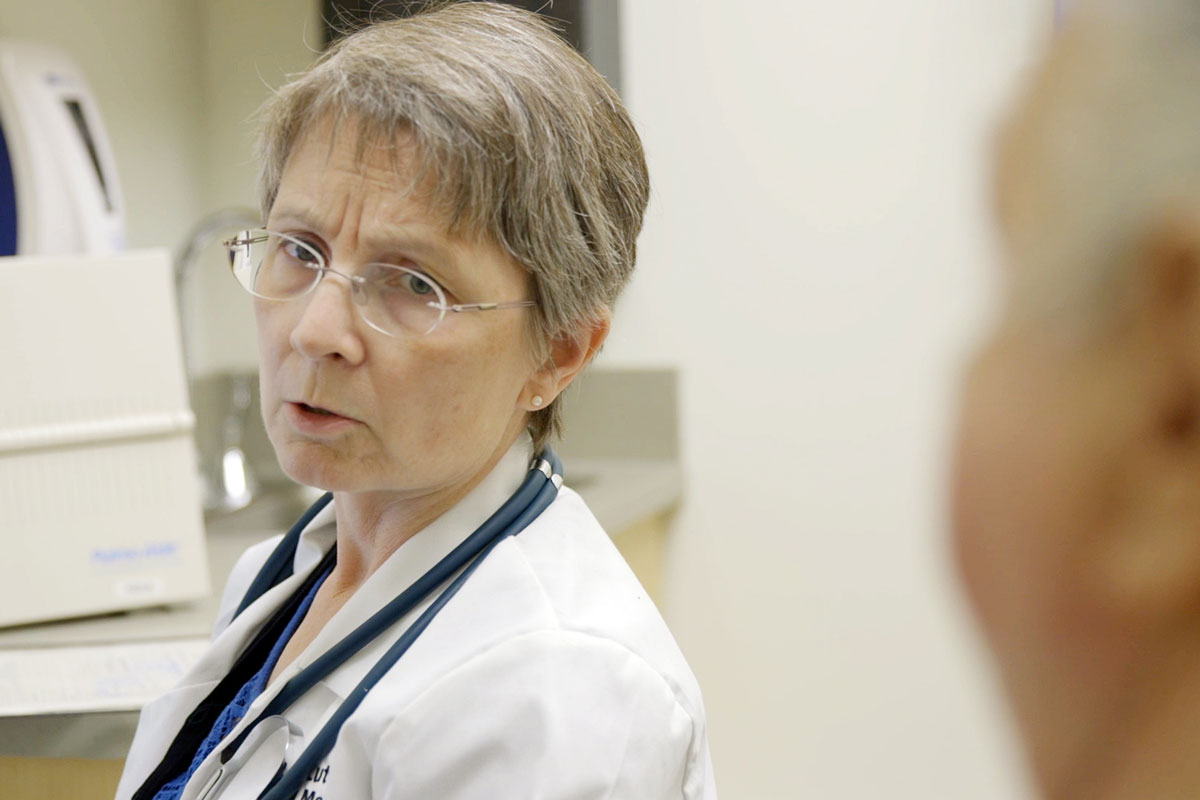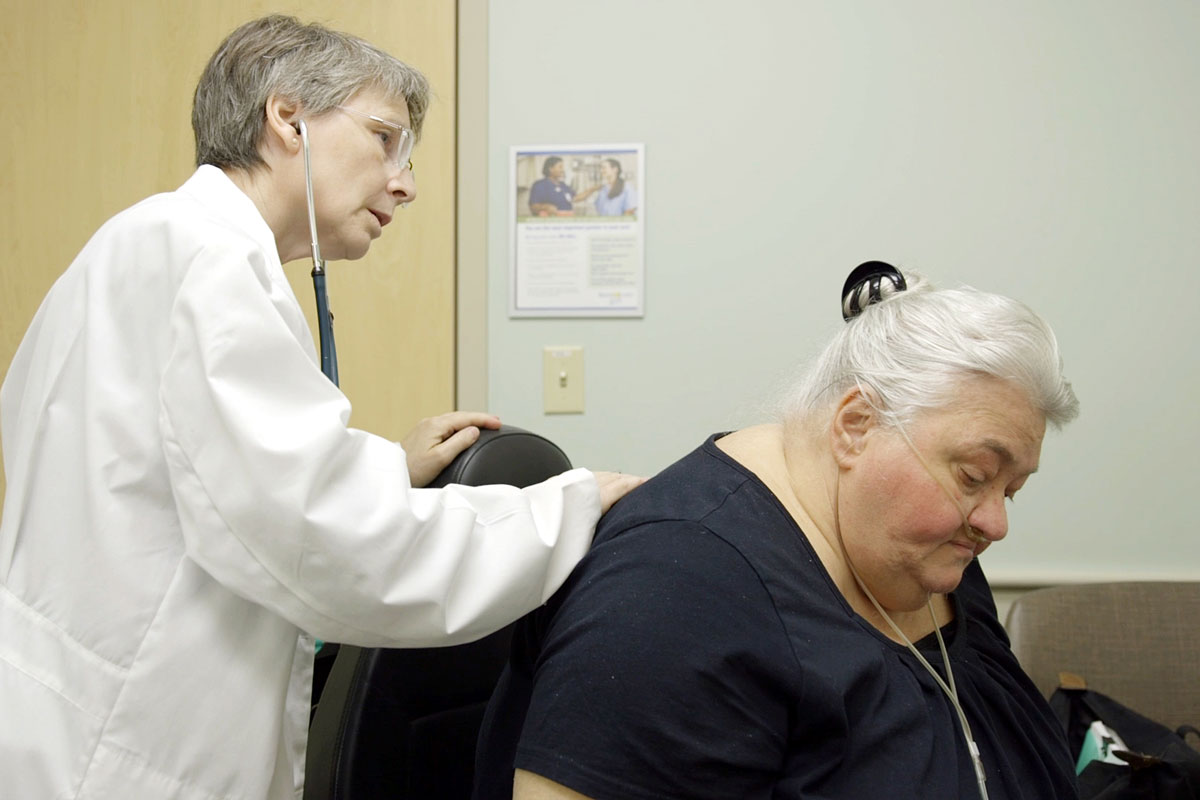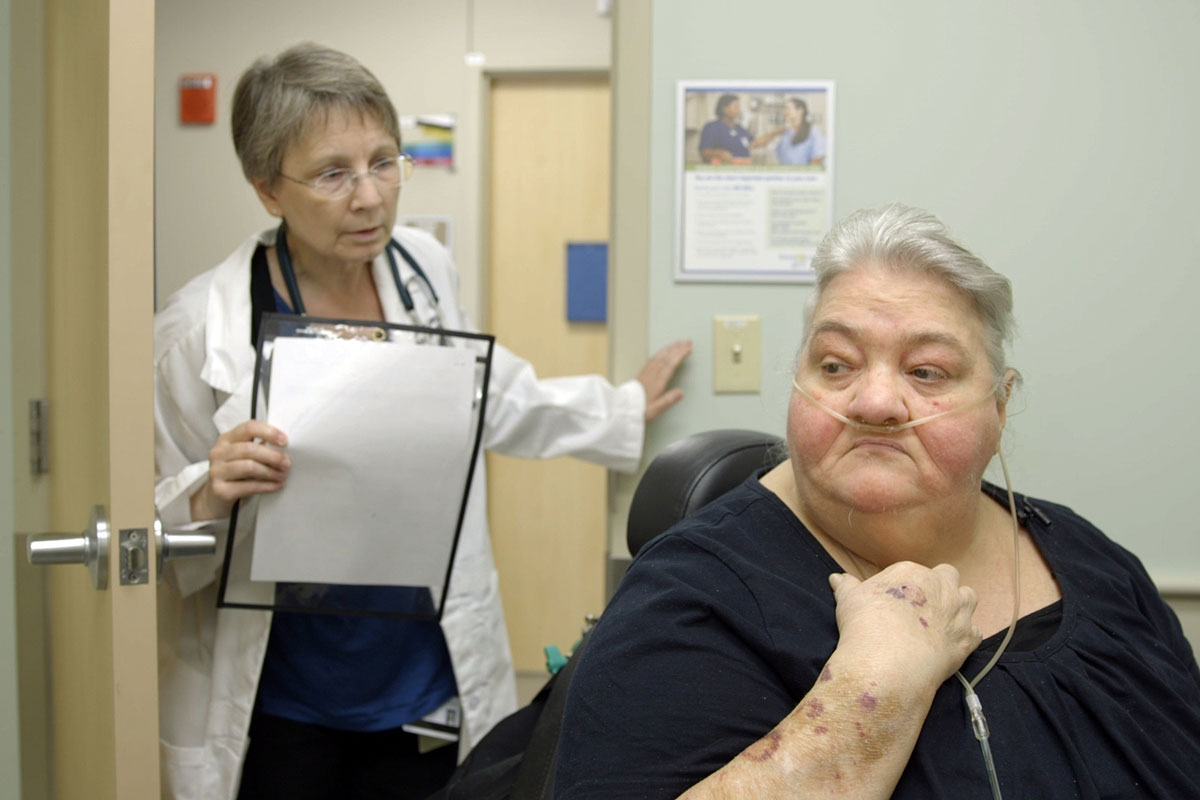Physician’s call to action: Compassionate medicine
Barbara Lutey assesses patients' medical, social, emotional health in determining care
Huy MachBarbara Lutey, MD, an assistant professor in the Division of Medical Education at Washington University School of Medicine in St. Louis, takes myriad aspects of people's lives into consideration when treating them, including any roadblocks to good health they may face.
A nearly empty refrigerator taught Barbara Lutey, MD, one of her most important lessons in medicine.
Nearly two decades have passed, but the image of the desperate older woman whose refrigerator only contained walnuts, bacon and a half bottle of soda continues to sear. At the time, Lutey was an intern in her internal medicine residency, working at a clinic at Washington University School of Medicine in St. Louis. She was interviewing the woman, a primary-care patient with diabetes.
“I was trying to figure out the cause of her low blood sugar when it dawned on me to ask a very basic question,” said Lutey, now an internist and pulmonologist and an assistant professor in the medical school’s Division of Medical Education. “I remember feeling a sense of dread as I waited for her answer.”
Lutey looked directly into the woman’s eyes.
“Do you get enough food to eat?”
The woman hung her head.
“I’m hungry,” she answered.
The woman told Lutey about her need to ration the bacon, walnuts and soda so they’d last several days since she had no money for food.
“I was shocked,” Lutey said. “In medical school, the emphasis was on standardized patient treatment. In that moment, I realized the importance of looking beyond what is taught and to view a patient as a whole person with complexities outside of the exam room that may pose major hurdles to good health.
“After all of these years, I remember the moment so clearly, and it is still so painful.”
Lutey completed her residency in internal medicine and a fellowship in pulmonary and critical care medicine, then returned to the Division of Medical Education as faculty.
Lutey now practices primary care at the Pulmonary Clinic at the Center for Outpatient Health on the Medical Campus and at Affinia Healthcare, a community health center headquartered in north St. Louis. She has dedicated her career to community health, tending to poor, homeless and mostly uninsured patients who lack the means to navigate the complicated U.S. health-care system.
With the assistance of her colleague, Emily Rumora, MD, an instructor of medicine in the Division of Medical Education, she trains residents and students on the medical, social and emotional challenges affecting the uninsured and underinsured. Rumora is medical director of the Primary Care Medicine Clinic in the Center for Outpatient Health and also works at Affinia Healthcare.
Straight-faced, fast-paced
 Huy Mach
Huy MachMemories of encounters with patients suffering from poverty, homelessness, domestic and street violence, as well as mental illness may become overwhelming during private reflection, and Lutey recalls episodes where she and patients cried together over diagnoses or particularly tragic events. However, most days Lutey is straight-faced and fast-paced, channeling her compassion into advocacy — such as when she located a social service program to help provide daily meals for the woman with the bare refrigerator.
“My empathy and sympathy are best expressed by problem solving,” Lutey said. “I use my ingenuity, time and energy to try to fix patients’ problems as best I can. This is what my patients need. I see it as a call to action.”
She may coach patients who cannot afford frequent prescriptions or physician visits on how to stretch services in a medically safe manner. A patient with diabetes, for example, may be able to check blood pressure for free at a drugstore pharmacy.
“I’ll call them for blood pressure or blood sugar readings and advise medically,” Lutey said. “I try to do as much as I can by phone to save on co-pays, transportation costs and other possible health-care barriers confronting the underserved.”
Through her clinic and volunteer connections, Lutey is tightly connected with agencies that provide transportation, shelter or clothing, for instance, as well as services involving drug and alcohol addiction, utility subsidies, and pregnancy and childbirth, among others. She donates about 15 hours per month to church-affiliated groups such as the St. Vincent De Paul Society and the Peace and Justice Commission, and volunteers her clinical skills at Casa de Salud, a nonprofit primarily serving Latinos and immigrants.
However, Lutey reminds herself, residents and other health-care workers to avoid stereotypes associated with the poor. “There is a perception in society that these people have not been successful in their lives,” she said. “That is not true. Most are hard-working, good people who have achieved a lot after overcoming many obstacles.
“It’s also important to remember that the obstacles stem from more than just lack of money,” Lutey added. “Many have terrible stressors in their lives — such as not feeling safe in their homes because of gunshots outside or because their housing is at risk for electrical fires or other unsafe conditions because the structures are not up to code. Despite their burdens, I’ve found most of my patients to be appreciative, kind people. I am lucky to get to work with my patients.”
Teaching compassionate medicine
 Huy Mach
Huy MachThose within the St. Louis community and School of Medicine reciprocate Lutey’s sentiments.
“Dr. Lutey beautifully illustrates the high-quality, mission-based health care we are passionate about,” said Melissa Tepe, MD, vice president and chief medical officer for Affinia Healthcare. “Our communities and patients deserve this level of care and problem-solving that combines not only medical knowledge but a deep understanding of the social factors influencing health and patients’ daily challenges.”
Melvin Blanchard, MD, director of the university’s Division of Medical Education and of the Internal Medicine Residency Program, said Lutey’s approach is far-reaching.
“We are fortunate to have someone like Dr. Lutey, whose impact is not limited to what she does for her patients, but who is influencing the practice of young physicians for the duration of their careers,” said Blanchard, who is also a professor of medicine. “No doubt, her work as an individual physician has enhanced the quality of life for many in our city, but through those physicians in her influence, she will have a positive impact that lasts beyond her.”
Lutey already has made a better physician out of Benjamin Rogers, MD, who trained under her last fall as a third-year resident at Barnes-Jewish Hospital. “Dr. Lutey’s example serves as an inspiration for the way compassionate medicine should be practiced,” he said. “She spends countless hours looking up her patients prior to their clinic visits, calls them personally to remind them of appointments, and I have witnessed her on more than one occasion physically wheeling a disabled person around the clinic. I have never beaten her to the clinic in the morning and have frequently run into her in the hospital during my own night shifts.”
Lutey is not one to bask in such praise. For her, satisfaction comes when a resident — such as Rogers — makes the connection between poverty and health care.
“It is easy to become disheartened when patients consistently admit to eating high-salt diets,” Rogers said. “But now I’ll ask plainly, ‘Can you afford to eat anything other than hot dogs?’ Quite frankly, this is a leap most medical professionals will never make or fully comprehend. Dr. Lutey not only understands the significance, but she goes out of her way to help us grasp it, too.”
‘How to not die’
 Huy Mach
Huy MachHer patients appreciate it, as well. Marie Nesbitt met Lutey at a clinic in 2012, when she started experiencing difficulty breathing. “Dr. Lutey didn’t baby me or pamper me, and I didn’t want her to,” Nesbitt recalled. “I wanted to know how to not die, and Dr. Lutey gave it to me straight. She said, ‘If you quit smoking, you’ll live longer; if you continue to smoke, you’ll die sooner.’ ”
Nesbitt quit smoking.
She continued to see Lutey over the years for an inflammatory condition that has landed Nesbitt in the hospital multiple times over the years.
“She visited me in the hospital on her own time, and she told me step by step what I needed to do,” Nesbitt recalled. “She is 100 percent behind her patients.”
On a winter morning late last year when the high temperature reached 3 degrees, Kathryn Parker, an intern in internal medicine, consulted with Lutey on medical issues before examining a patient at Affinia Healthcare.
“Be sure to ask the patient if he has heat,” Lutey said.
Parker hadn’t thought of that. “It wouldn’t have occurred to me to ask about heat if Dr. Lutey hadn’t prodded,” Parker said. “She is a wealth of resources to this community. She even continues her devotion by volunteering and knitting scarves for the homeless.”
In an Affinia Healthcare exam room, Keith Farmer, a 29-year-old who is frequently hospitalized for asthma, answered Lutey’s long list of questions on everything from sleep and diet, to copay hardships, to the challenge of finding a place to exercise when he cannot afford a gym membership and must avoid prolonged periods outside, where potentially violent stray dogs roam the neighborhood.
By the time his appointment was over, Farmer had a referral for a gym with discount rates, a same-day appointment at Affinia Healthcare for a flu shot and a dental exam, and affordable nutrition tips, such as substituting his morning English muffin with oatmeal.
“This was the first time I saw Dr. Lutey, and I feel like we accomplished a lot in one visit,” Farmer said. “I also appreciate how she understood that copays impact my budget. She made me feel respected.”
For Lutey, her work is a calling.
“I have the privilege to serve good people who otherwise might not receive medical care,” Lutey said. “I’m where I need to be.”
Barbara Lutey
Age: 57
Hometown: Elkhart in northern Indiana
Professional experience: Lutey earned a bachelor’s degree in chemistry and a master’s in library science at Indiana University in 1982 and 1983, respectively. She then worked as a librarian for the National Institutes for Health (NIH) in Bethesda, Md., and as a volunteer emergency medical technician and then paramedic with a rescue squad. She earned her medical degree at the University of Iowa in 1999, and completed her postgraduate training at Washington University before joining the faculty in 2009.
Hobbies: Ballet, knitting, opera, reading.






